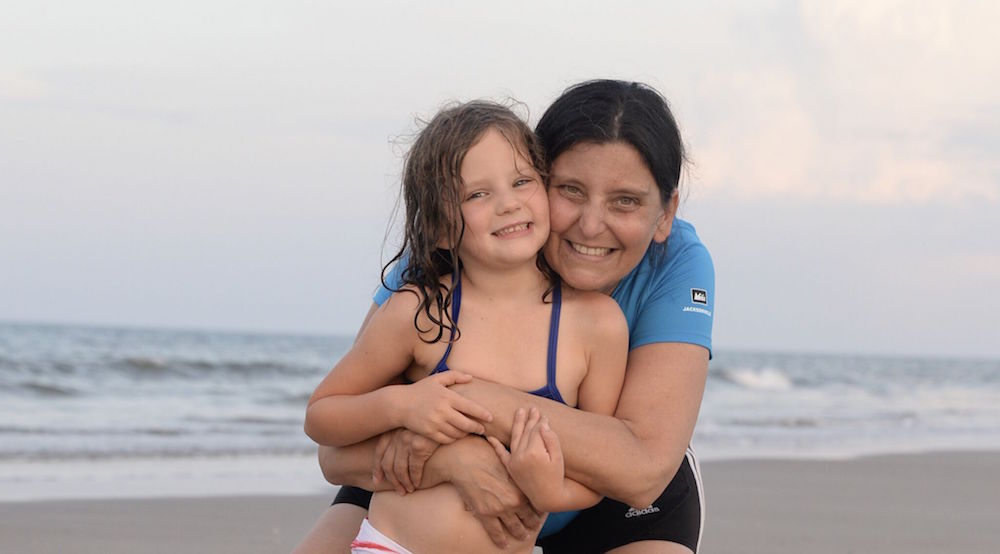When Stacy Hanson was diagnosed with metastatic breast cancer in early 2017, she immediately assumed she had no viable treatment options. Now that she is living a full, active lifestyle with her incurable yet treatable disease, she wants others to know that they can, too.
Hanson, 49, is on a clinical trial that she began in the Susan F. Smith Center for Women’s Cancers at Dana-Farber. The trial, combining immunotherapy and a PARP inhibitor, is doing the job: Her metastatic breast cancer (also known as stage IV or advanced breast cancer) is currently in check, and a breast tumor that had appeared in her liver is now greatly reduced in size.
Clinical trials are scientific studies in which new treatments—drugs, diagnostic procedures, and other therapies—are tested in patients to determine if they are safe and effective.
Hanson is tolerating her treatment extremely well. She is enjoying time with her family, her full-time job as a sales executive, and, when her busy schedule allows, a few hours of semi-solitude on her paddleboard.
“There is no cure for stage IV metastatic breast cancer, but there is life after this diagnosis,” says Hanson, who lives with her husband, Kent, and six-year-old daughter, Lucy, in Jacksonville, Florida. “I’m focused on spreading that message.”

Just 2 percent of women (and men) with metastatic disease are on clinical trials, and Hanson says many people she talks to are not aware there are trials that can help them.
She was once one of those people. Initially diagnosed with breast cancer in 2014, Hanson had 16 weeks of chemotherapy and 35 radiation treatments in Florida. She was scheduled for a lumpectomy, but upon learning that she was a carrier of the BRCA1 gene mutation—which greatly increases the odds of another breast cancer or ovarian cancer diagnosis—instead opted for a bilateral mastectomy, oophorectomy (ovary removal surgery), and hysterectomy.
By March 2015, she completed chemotherapy, surgery, and radiation, and had started on adjuvant endocrine therapy. Then, two years later, doctors found a lesion on her liver. Her breast cancer had metastasized into triple-negative, stage IV disease.
Florida doctors offered Hanson standard treatment options, but wanting to learn more, she sought a second opinion at Dana-Farber. Erica Mayer, MD, MPH, senior physician in the Breast Oncology Center at the Susan F. Smith Center, said that in addition to standard therapies, there were several promising clinical trials that might be options for Hanson. The best option for her—a trial that is exploring a combination of two drugs in patients with the BRCA-1mutation—had an opening right away.
Hanson started on the trial in March 2017. In addition to oral medication she took daily, she and Kent spent nearly a year traveling to Boston each three weeks for immunotherapy infusions. Family and friends cared for Lucy back home.
“There is no cure for stage IV metastatic breast cancer, but there is life after this diagnosis.”
The results were so encouraging that Mayer felt comfortable transferring Hanson’s care back to Florida when an arm of the trial opened there in early 2018. The tumor in Hanson’s liver has shrunken considerably, and no other new tumors have emerged. She now has more time for her advocacy work, which includes raising funds for stage IV metastatic breast cancer research and clinical trials, and educating patients with the disease about trial opportunities.
“We are thrilled that the clinical trial combination therapy has been so successful in fighting Stacy’s cancer,” says Mayer.
Hanson knows there is a 50 percent chance that Lucy may also carry the BRCA1 gene, which Hanson inherited from her father. But until Lucy is tested as a young adult, Stacy will focus her energy on spreading the word to others.
“There is a lot that people don’t know—like the fact that you can inherit the BRCA1 gene from your father, not just your mother,” says Hanson. “You just need to find the options open to you, and take advantage of them.”

